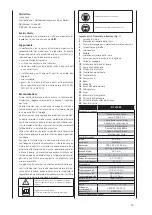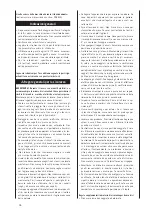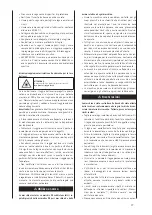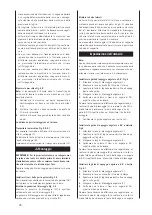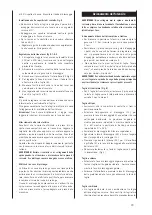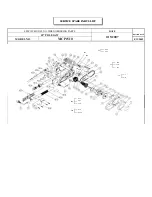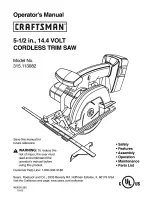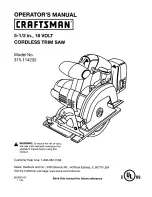
14
transporting the Machine Fig. 2.0-2.1
Slide the traction sled (1) until it stops and secure it with
the clamping screw (A).
Lower the cutting head downwards until it stops and push
down the lock lever (B).
Hold the mitre saw by the provided handle (19) for
transportation.
m
Assembly
WARNiNG! For your own safety, never connect the plug to
power source outlet until all assembly steps are completed
and you have read and understood the safety and operational
instructions.
Lift the saw from the packaging and place it on your
work bench.
installing the Dust Bag Fig. 2.2
Place the dust bag (18) on the outlet at the upper blade
guard.
Mounting the Clamping Jaw Fig. 2.3
Mount the clamping jaw (17) and secure it with the
clamping screw (C).
The clamping jaw has a quick adjustment, which is
triggered by pressing the button (D).
Attaching the side bars
The side support bars (10) help to support the material
when working with long work pieces. There are two
location holes (25) for a support bar on either side of
the table. Loosen the lock knobs on the back of the base
at the bottom. Ensure the side bars are fully inserted
before using them to support the work piece
The side support bar locking knobs (H) must be tightened
to secure the support bars in position.
Setting the tool
Note:
This tool is accurately adjusted before shipping from
the factory. Check the following accuracy and readjust if
necessary in order to obtain the best results in operation.
installation of the Angle Fence at 90°, Fig. 3
1
Loosen the angle clamping lever (1).
2
Lock the ratchet lever (2) towards the inside.
3
Move the cutting head to the right until it rests
against the fence.
4
Tighten the angle clamping lever (1).
5
Test the saw blade with a 90° angle to the saw table.
If an adjustment is necessary, loosen the lock nut (3) and
position the socket screw (4) in such a way that the saw
blade stands at 90° to the table. Re-tighten the lock nut.
6
Set the angle fence with the screw at 0.
installation of the Angle Fence at 45° Left. Fig.4
1
Loosen the angle clamping lever (1).
2
Move the cutting head to the left until it rests against
the fence.
3
Tighten the angle clamping lever (1).
4
Test the saw blade with a 45° angle to the saw table.
If an adjustment is necessary, loosen the lock nut (5) and
position the socket screw (6) in such a way that the saw
blade stands at 45° to the table. Re-tighten the lock nut.
installation of the Angle Fence at 45° Right. Fig. 4.1
1
Loosen the angle clamping lever (1).
2
Lock the ratchet lever (2) toward the outside.
3
Move the cutting head to the right until it rests
against the fence.
4
Tighten the angle clamping lever (1).
5
Test the saw blade with a 45° angle to the saw table.
If an adjustment is necessary, loosen the lock nut (5) and
position the socket screw (6) in such a way that the saw
blade stands at 45° to the table. Re-tighten the lock nut.
installation of the Contact Surface, Fig. 5
• Lower the cutting head and push in the lock pin. Make
sure the table is in 0 mitre position.
• Place a combination square against the fence and next
to the saw blade.
• Loosen the two screws (7) if the saw blade does not
touch the protractor.
• Adjust the fence so that the fence has full contact with
the square. Tighten the screws.
Adjusting the Laser Line Fig 5.1-5.2
1
To adjust the laser beam, take a board (approx. 200
mm x 300 mm) mark a line at the right angle and
place the board on the contact surface of the table.
2
Align the mark to the centre of the saw blade and
clamp it firmly with the clamping shoe.
3
Turn the laser on with the switch (23 Fig.1).
4
To adjust the laser line, pull the cover (A) and loosen
the slotted screw (B).
5
Now move the laser unit until the laser line fits in
with the marked line.
6
Fine adjustment can be done with the two slotted
screws (C) and (D)
Note:
You can adjust the laser line so that it runs on the side
or in the middle of the cut.
7
Tighten the slotted screw again and slide the housing's
cover back on the laser unit.
Caution!
Do not stare directly into the laser beam, read
the safety instructions for laser light.
Connecting to the Power Supply
Check that the power supply and outlet used are in ac-
cordance with your mitre saw. Have a look at the rat-
ing plate of the motor or the rating on the mitre saw.
Any changes should always be carried out by a qualified
electrician.
This is a double insulated tool which eliminates the need
for an earthed power supply system.
WARNiNG! Avoid contact with the terminals on the plug when
installing (removing) the plug to (from) the power supply
outlet. Contact will cause a severe electrical shock.

























